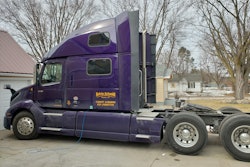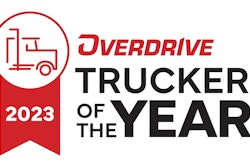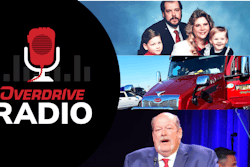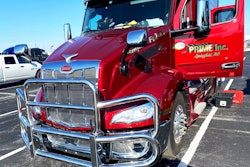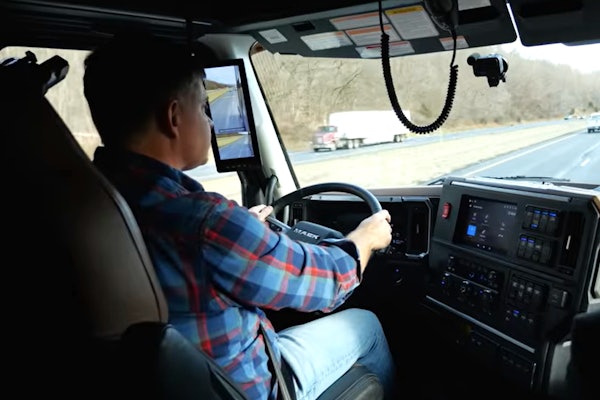Owner-operator Kelvin Schmidt, Trucker of the Month for January in Overdrive's 2023 Trucker of the Year program, didn't come to a formula for enduring success without a tour through the proverbial school of hard knocks, as it were. In today's edition of Overdrive Radio, hear his own account of his start as a flatbed-pulling hotshotter in a one-ton dually, his learning-experience stumbles through other trucks and growing "as bad as an accountant" with a focus on costs, revenue and profit per-trip to keep a guiding hand on the business.
"You've got to know what your costs are, and I do that for absolutely every trip I do," he said. "Every trip." Diligence in tracking costs enabled some of the big early shifts in his approach to equipment. After bad experiences with a variety of used trucks -- then with a newer yet no-less-problematic glider -- he changed tack and began purchasing new with factory-extended warranties, realizing full well the costs not just of repairs, but also of accompanying downtime. And cost diligence doesn't of course have to occur via any particularly sophisticated-looking or even very complicated system.
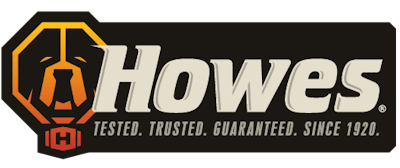 Special thanks to Overdrive Radio sponsor Howes for making the podcast possible. Read more about their anti-gel fuel treatments like Diesel Treat and Life and other products via HowesProducts.com.
Special thanks to Overdrive Radio sponsor Howes for making the podcast possible. Read more about their anti-gel fuel treatments like Diesel Treat and Life and other products via HowesProducts.com.

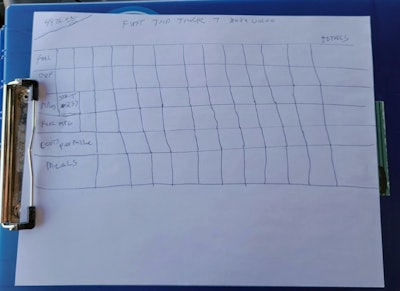 Trucking's not rocket science, but close tracking of costs does require diligence, that's sure, something Schmidt feels has been crucial to his success.
Trucking's not rocket science, but close tracking of costs does require diligence, that's sure, something Schmidt feels has been crucial to his success.
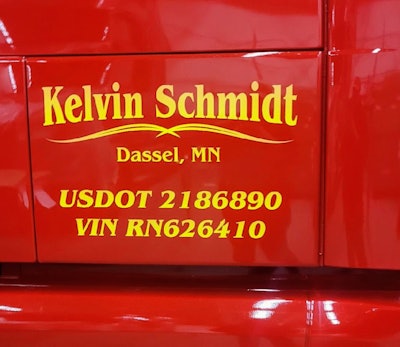 So far so good with the new iron, he noted.
So far so good with the new iron, he noted.
His end-of-year profit-and-loss statement for 2022 showed the above-average results of all of it, even with massive cost inflation and an ungodly-looking fuel bill for year.
In this podcast, he tells his trucking story, which follows a childhood and decades as an adult in Canada. His move to U.S. citizenship set him on the course he's charting today trucking, as a proud father of six young children with his wife, Jennifer. Hear the story in Schmidt's own words here:
As January Trucker of the Month, Kelvin Schmidt in the running as a semi-finalist for the Trucker of the Year award. I’d encourage you, too, if you’ve thrived even through the tough conditions of the last year, or if you know of a deserving owner-operator who fits that description, to get over to our nomination page for the Trucker of the Year award and get in the running. It’s open to owner-operators leased or with authority, operating up to a maximum of three trucks as part of the business.
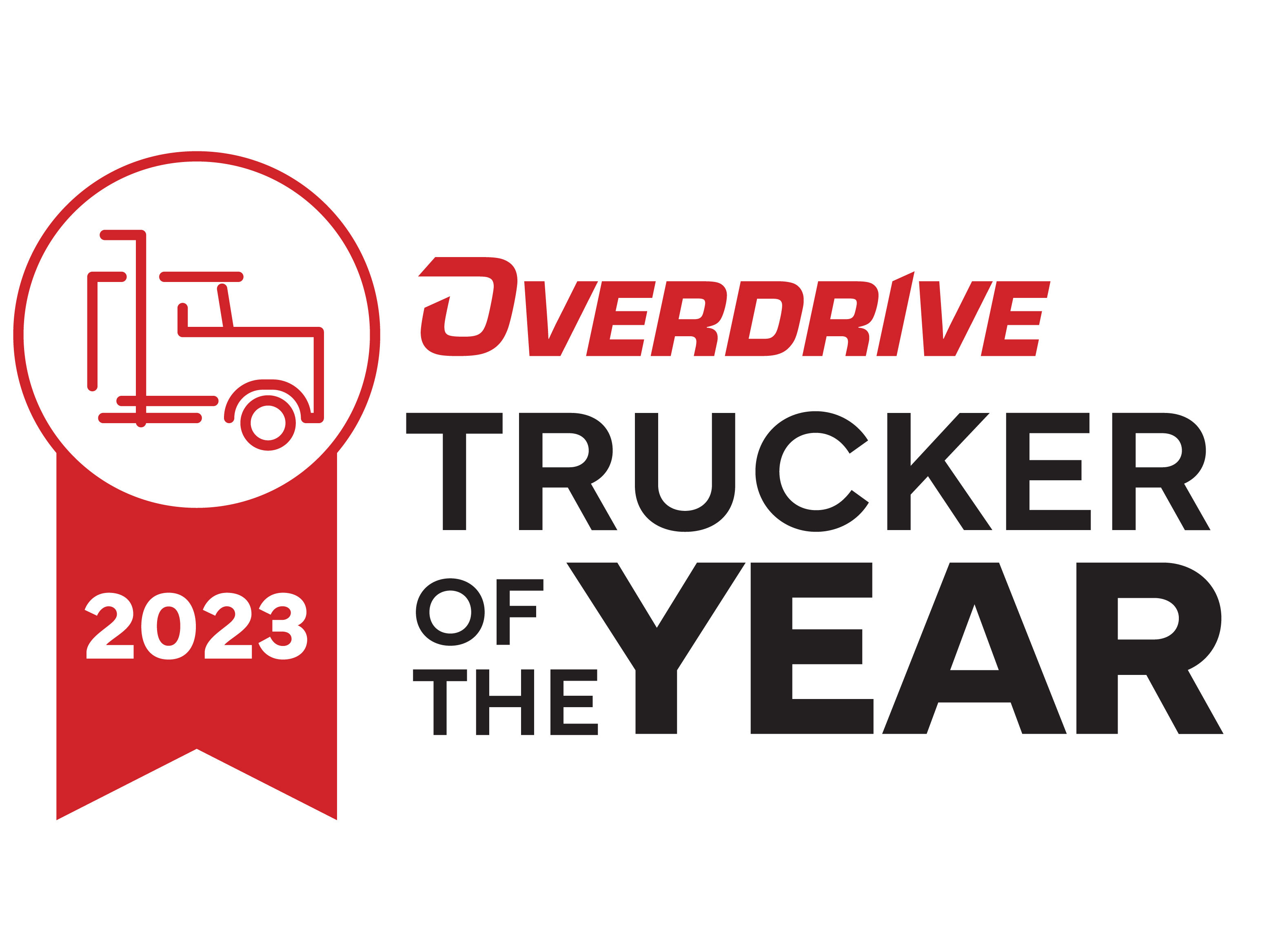
Enter Overdrive's 2023 Trucker of the Year competition
Enter here | Overdrive's 2023 Trucker of the Year program recognizes the business acumen and innovation of the owner-operator, the bedrock of the entrepreneurial spirit in trucking. If you’ve controlled costs and maintained profits amidst record inflation, you're a worthy contender.
Kelvin Schmidt: Like I say, you’ve got to be an accountant. Okay? You can't just sit in the truck and drive it. You got to know what your costs are. You got to know what your profits are, and I do that for absolutely every trip, I do, every trip, okay?
Todd Dills: So I'm super excited about the many nominees we've gotten so far for Overdrive's 2023 Trucker of the Year program, built to recognize and honor the success independent owner-operators, whether leased or with authority, all around the nation. One of the nominees you heard up top, that was Kelvin Schmidt based in Dassel, Minnesota after a childhood and much of his adult life too in Canada. He's trucked though for more than a decade now after immigrating to the U.S. and after other careers, all that trucking done as an independent with authority. I'm Todd Dills, Overdrive editor and your host as usual for this February 10th, 2023 edition, the Overdrive Radio podcast. Owner-operator Kelvin Schmidt was our January Trucker of the Month, putting him in the running as a semi-finalist for the Trucker of the Year award. I encourage you, too, if you've thrived even through the tough conditions of the last year, or if you know of a deserving owner-operator who fits that description, get over to our nomination page for the trucker of the year award and nominate yourself or someone else.
It's open to owner-operators leased or with authority, operating up to a maximum of three trucks as part of business. I'll drop links to the nomination form in the show notes of this podcast and in the posts that houses it at overdriveonline.com/overdrive-radio. In today's edition, we're going to hear much more from Trucker of the Month, owner-operator Kelvin Schmidt, whose early learning experience cemented that close cost and profit tracking strategy you heard him mention up top. He's learned several things the old hard way as it were including the value and maximizing uptime. However, you do it.
Kelvin Schmidt: Then had other little issues, and I just got sick of it because it all, it was wasted time. It took them two months to paint the truck. Two months of downtime, right?
Todd Dills: The importance of operational shifts, equipment choice, and basic driving tactics to achieve the greatest fuel mileage possible.
Kelvin Schmidt: I used to get five miles to the gallon. You know how you don't make money? Five miles to the gallon, right?
Todd Dills: The huge dividends that can come back with close attention to maintenance and alignment in particular, how's 400,000 miles out of a set of steers sound?
Kelvin Schmidt: The Michelin steer tire is worth a lot of money, but I don't know any other steer tire that's gone 400,000 miles.
Todd Dills: Successful owner-operators will always have their eyes on the curve ahead anticipating what's coming, as Schmidt tells it.
Kelvin Schmidt: You got to think ahead. You can't just think at the moment when you say, "Oh, just give me the cheap $300 steer tire," 40,000 miles later, it's all cupped on the edge. I've done it, so I've learned a lot, and that's what it is in this industry. In this industry, you got to learn things. You got to stay ahead. You got to know your costs but that's why I bought a new truck, right?
Todd Dills: That's right. After a series of used vehicle purchases, difficulties with maintenance, with downtime, Schmidt shifted to new purchases to keeping the truck under warranty. He's on his third new Volvo now, just took delivery of it in fact the week before he told his story at overdriveonline.com late last month. It's VNL 860. Find pictures of it via that story also in our truck of the year website section.
Kelvin Schmidt: Drive the truck, okay? It's that simple. Don't let the truck drive you. You drive the truck.
Todd Dills: After a quick break for a word from Overdrive Radio sponsor Howes, we'll drop into more with Schmidt detailing his maiden voyage more than a decade ago now, hauling freight as a flatbed hotshotter, and the long evolution to what he does today. Pulling drive vans power only with broker and carrier T Bros. Logistics out of Sioux Falls, South Dakota. Keep tuned.
Speaker 1: Now that winter's here, it's time to prepare yourself for the conditions you'll encounter by adding Howes Diesel Treat at every fill up, you can prevent your diesel fuel from gelling in even the coldest temperatures. While it safely removes water, adds lubricity, and prevents deposits, the nation's number one anti-gel will help protect your engine and provide you with the added power you crave. Backed by the only no tow guarantee, Howes Diesel Treat will keep you rolling no matter what weather comes your way. Learn more at howesproducts.com. Howes, tested, trusted, guaranteed.
Kelvin Schmidt: I live in Dassel, Minnesota. I'm married and I have six children, three boys, three girls, wonderful family, wonderful wife. It's all about relationships, right? With your customer, with whatever. But anyways, back in when I first started this, I said, "You know, I got to find a way to make enough money because I want my wife to be home with the children. I don't want them to be raised by daycare, and I want to be successful at it." So my theory was, okay, I got a wife, six kids, four kids, whatever, when I first started, three kids, whatever it was. I think it was actually one kid to start with, okay?
Because, well, it was two because I started this in 2011, because I worked other jobs and then I moved from Canada to the U.S. And I worked odd jobs here and there and you just couldn't get ahead of the game. So I said, "I got to think of something to do that I know I will be successful at for myself and for my family." So I said, "You know what? I know how to drive a truck. I learned on the farm." Then I studied, I read all about the rules, DOT rules, what you have to do. Then I have some friends that were truck drivers way back when, and I went to school with up in Canada. I said, called him up, "Frank, how are you? What do you think?" "Well, Kelvin, you know how," and I was self-thought, I guess you would say, by educating yourself, watching, learning. And the most important aspect in trucking, which I think is a real asset is you got to have good credit. You have to have good, really good discipline, and I got a background where I was brought up totally disciplined.
You're going to do something, do it the best you can, put your heart into it, put all you got into it, you will be successful, right? You got to be disciplined, you got to be great, you got to be an accountant. Let's just say that, you got to be really good with money. So I got this little one-ton. I thought, "Oh, I'll try this." So I bought a one-ton Ford. On a gooseneck trailer, I even put a little sleeper on the one-ton, okay.
Yeah, I got a sleeper custom-made for it in Dallas, Texas. I said, "Well, I'm going to try this." Well, being new at this game, I was picking up partials and stuff and I realized, you know what? This is not the kind of truck you use for trucking. I learned really fast that power stroke, 7.3 with a 36-foot trailer, you can put weight on it, but you go through tires once at a month and you go through oil changes, you're supposed to change. You know what I mean? So the maintenance, I did all that. Then I said, "I'm not making enough money to live." So I thought about it again. Okay, I got to redo this.
Todd Dills: How long were you doing it with that setup?
Kelvin Schmidt: Six months. Well, while you learn, when you're seeing the numbers and the reality of it. I joined a load board first and I'd get my loads off the load board. Always, I've never driven a truck for anybody but myself. I didn't go to Schneider, Dart, none of that. I just hunkered down and started learning, and I've been very successful. Like I say, it's six months in the hotshot deal, you realize you're not making enough money, you're just spinning your wheels, right? It's working, but not well enough. So I went on to the next, bought an International little tractor. You listened to too many people and too many salesmen, and you learn from that too. I bought this little tractor. Same thing, it was a single axle tractor, same trailer. And I did that for a couple of months and then I realized, this is not right. This is not going to work.
Todd Dills: Were you trying to approach it in a similar way, freight-wise, the way you were doing with the hot shot? This was the flatbed trailer you had?
Kelvin Schmidt: Yep, I had the same trailer, but a little bigger tractor, and I tried to get it to work, and you know what? It still didn't work right. You still can't haul enough freight because everything's heavy in the flatbed world. And I said, "Wow, this is enough of that." Advertised that, got my money back out of that, and I bought a big, I bought another, a real tractor this time, and a 50-foot or 48-foot flatbed right?
Here I am with my real tractor, dual axle tractor, carry 80,000 pounds total, got this beautiful flatbed, and I did that for years. Now the tractor I changed out, that one. The next tractor just got so costly to repair all the time. It was also an International, yes, it was an International, 2007. You listen to people. They tell you get pre-emission, blah, blah, blah, blah, blah. Well, I listened and then I learned, okay. Well, that was the wrong thing to do because that poor 2007, I bought it. Lucky I paid cash for it. I thought, "Well, I'll pay cash for this and try it out." Well, in that first year of paying cash for that 2007, that little 2007 cost me $60,000 in repairs in one year. Once again, I'm saying this is not good. I'm going backwards again. Well, not totally backwards, but you're still not making the income that you can make, and I know that, right?
So I used to work off a load board, and then I got a hold of brokers, and then brokers would say, "Well, do you want to pull the load for us?" And I'd run up to Northern Canada with my load, and then I'd bring hay bales and straw bales back from Canada into the U.S. I did that for a while, and then the old, I called it the green Hulk. The green Hulk, I had enough, was a green International. I had a green Hulk on the side, and I just said, I'm going, like I say, you got to be an accountant. Okay. You can't just sit in the truck and drive it. You got to know what your costs are. You got to know what your profits are, and I do that for absolutely every trip, I do, every trip, okay?
Kelvin Schmidt: So I said, "You know what? I got to figure out how to get my costs under control." So I finally got what I had to do, and it's worked ever since. I took that, I sold that green International $20,000 out the door. Bye-bye. See you. So sad. Don't want to see you again. And I said, "Now, I got to do this right." So I went to dealerships. So what I did, actually, I bought a Fitzgerald Glider truck, Coronado. And that was another mistake.
Todd Dills: What year was that?
Kelvin Schmidt: Right around 2011. Oh no, let's say 2013. That's better, yeah. Exactly, that's exactly right. 2013, I go buy this Fitzgerald Glider site unseen, down there with a big old check in my hand, right? A hundred and whatever it was, $110,000, thinking, "Oh, I got the right situation now." It made money, but it only lasted. I sold it with a hundred thousand miles on it. It wasn't the drive line that was no good, to be honest with you. The setup didn't work well in the winter. I had so many problems with air dryer freezing up, an airline freezing up because the air dryer's way at the back, and I got a full warranty on this, so I'm taking it to Freightliner, right? They're fixing this, and then all the paint came off. I'm washing the truck one day and the paint just rolled right off of it. It's in big sheets, okay? I'm going, "What the heck? The paint's falling off." I'm actually washing the truck in Saskatoon, Canada. Took a load up there of concrete stuff, washing it, put the spray wand, nice hot summer day, cleaning the bugs off, washing it, and four foot squares of paint are just flying right off the truck. And this is in the first 12 months. This is about six months in.
Todd Dills: This is a new truck too, right?
Kelvin Schmidt: Brand new truck, brand new. I'm going on my word, paint's falling off. I panic. I get on the phone, take pictures of it, send it up to the Freightliner dealer, and I said, "I washed my truck and all the paint came on, the paint's coming off. How's that?" So they end up repaint the whole truck. Then had other little issues and I just got sick of it because all it was wasted time. It took them two months to paint the truck. Two months of downtime, right? So as soon as I got it back, I cleaned it up, which was never in bad shape at all. It still looked like a brand of the truck, just had no paint on it and put it up for sale, sold it for a hundred thousand dollars. Then I got smart.
Then I looked around at all the dealerships. I walked into a Volvo dealership. The office section was closed. It was after five o'clock. I had a great plan, went to the back shop and one of the mechanics was outside bringing in a truck. I said, "You got a couple minutes? I want to ask your opinion about these Volvo trucks." And I gave him my little spiel. A couple of days later I walked into the Volvo dealership, sat down with the salesman, and I said, "You know what? I'd like to buy a new Volvo, 2015, brand new Volvo. What do you got?"
Todd Dills: What did that mechanic tell you?
Kelvin Schmidt: He told me that these trucks are very reliable. They're good. And I said, "You're not telling me that just because you work on them, right?" He says, "Oh, no, I would never lie to you. I'm a mechanic. They break, certain things break down, but generally, they're a very reliable truck." And we just started talking and showed me a truck and a motor. And then I came back and walked in and I said, "Okay, I got great credit, I believe. Here's 20 grand. I want to put that down and I want to buy a brand new Volvo."
And then I said, "You know, I'm going to tell you my scenario, I want to get a factory warranty that covers all the components." Volvo is a Volvo motor, correct? Volvo transmission, their own rear ends. It's their whole truck. Because the other trucks I had problems with was Eaton Fuller would blame the Cummins dealer for the fail in the transmission. And you'd go back and forth. It's not our fault. It's not our fault, right? Soon as I found out that the Volvo dealer had their own stuff in their own trucks, walk out of the dealership with my brand new 2015 Volvo. Smile on my face, still got my flatbed trailer, my big flatbed. I'm pulling for brokers. Brokers, you got to have a relationship, okay.
When you're on a load board, you see one job that's paying $10,000. The trouble is that people jump around, they jump from one job to the next, and they're always looking for that high dollar one load. Well, that one load doesn't bring you any more business. So I started working for brokers, then the brokers got to know me, and then I would do repeat business with the same broker. Never lost any revenue, got paid for every trip I did. And that's what you have to find. You got to make relationships. To their customers, I represent the broker. That's who I represent. The company that I pull freight for, I'm a representative for them. So I have to act accordingly. I got to know everybody that I go to and repeat. "Kelvin, come on in, have some coffee," whatever.
And you just got to be like a clock. You got to be driven. You got to be absolute. I'm disciplined. I run 600 miles plus every day that I'm out. That's how all of my stuff is time delivery. You got two days to get to New Jersey from Minneapolis or two days to New York, three days out to California. So you have to be committed to that customer. And I'm not talking just the broker, it's their customer. You got to be have a relationship with them. They know you're coming. You're supposed to be in that dock by 6:00 AM. Well, get there, back in that dock, go in the bunk, go to bed. They unload you. They're done their job. I've been in the sleeper for 10 hours. I got my next load back to Minnesota. That's what I do.
I go out and I get a load. I go out, I stop, get it taken care of while I'm in the bunk sleeping, go hook up to another trailer or get another load, get loaded, and go back home. I have six children and a wife, and they're really important. And that's why I chose to do this. I've been doing this ever since. I ended up selling my flatbed because I never used it anymore. Couple freight operations, a van, and I'm loyal to them, and they're loyal to me, right? StageCoach, Mary, StageCoach just out of Wisconsin. And what they did is they just sold, that's how I started pulling for this broker, Mary and Gary from StageCoach.
Todd Dills: That would be Stagecoach Logistics out of Prescott, Wisconsin. And owner-operator Schmidt noted last year, their van business was acquired by T Bros., headquartered in Sioux Falls, South Dakota. If you've read my reporting on Kelvin Schmidt from last week, you'll know I spoke to Nik Finley from T Bros. there. Finley lauded Schmidt's time management, what you just heard him speak to, said Finley, "It can be hard to find the guy who manages his personal wealth as well as Schmidt too. He understands fuel economy and rates per mile and what that all looks like," and should look like for profitability more important.
Kelvin Schmidt: And when I went from flatbed to the van, I realized my mileage is better. My profit is better because I'm pulling a van. People don't believe that, but I lived it. Flatbed, heavy freight, fuel mileage is low because it's not very aerodynamic on the flatbed, and the rates really are not much different anymore. So like I say, you got to be an accountant. You got to know your trips, you've got to know what you're pulling. You got to know where you're going. You use your Randy McNally, you go down the toll roads and you pay your tolls, and you get to where you got to be and you got to buy your fuel right.
Todd Dills: What kind of mileage are you getting out of your Volvo today? The second one you bought now, right?
Kelvin Schmidt: Yeah. My second brand new one. My third one was built yesterday as a matter of fact. I'll be probably getting that in a couple three weeks, and that should do nine and a half miles to the gallon, eight and a half consistent. And I mean, everywhere you drive, not just empty, not just full, not on flat ground. I run the speed limits and I pulled 7.6 with this truck, and I drive this truck, okay? You know what I mean? Not driving 55, not I'm in the seat on the highway running highway speeds, period. To me, 7.69, I have 728,000 miles on this one, and that's my real average, 7.69 since I've owned this truck. So to me, that's great mileage. Of course, in the winter it goes up or down. Summer goes up, you can call it eight and a half in the summer.
I used to get five miles to the gallon. You know how you don't make money? I put it all out to tax, five miles to the gallon, right? So the new Volvo, which they claim will do eight and a half miles to the gallon on any terrain at any speed, up to 85 miles an hour. They did a couple of new things, which I'm looking forward to. I have original brakes in this truck, that 728,000 miles, and I have original brakes still.
Todd Dills: And those are disc brakes, right?
Kelvin Schmidt: Yeah, disc brakes all the way around. I truly believe the first thing I did when I bought this truck, I took it over and got an all wheel axle alignment. I put Centramatic on the steer tires. Buy Michelin steers, I got 400,000 miles out of a set of Michelin steers, 16 ply mind you, but it's because you do the maintenance, okay? You got to check your truck, you got to take it in. My drive tires, I have a new rotated one tire, and all eight of them are worn exactly the same, no low spots, no high spots, but it's all in how you drive the truck and maintain it. That all axle alignment makes you money. It saves you money.
The Michelin steer tire is worth a lot of money, but I don't know any other steer tire that's gone 400,000 miles. So I put little money up front, saves a lot of money in the back end. And that's how you got to think. You got to think ahead. You can't just think at the moment when you say, "Oh, just give me the cheap $300 steer tire," 40,000 miles later, it's all cupped on the edge. I've done it. So I've learned a lot. And that's what it is in this industry. In this industry, you got to learn things, you got to stay ahead, you got to know your costs. And that's why I'm bought a new truck, right?
Put it this way, the old truck that cost me $60,000 to keep it running. So that when I came up with this, buy a new truck, my bills are fixed now. I know that it's cost me $2,877 a month for a truck payment. Not only does it help you, when you get a new truck, you depreciate it out over three years, you'll get to keep more of your money in your pocket. That's what it's about. It's not about, well, the new truck's, 200,000 plus, that number doesn't really mean anything. You have to keep control of your costs, and the only way to control your costs is to step up to the plate, get the truck, you have to pay the banker, get the depreciation, you'll end up putting more money in your pocket and you'll be reliable.
Reliability. A truck that's not sitting on the side of the road is a truck that makes you money. People say, "Well, I got one that's paid for." I said, "I've tried that." Because the problem there is when it comes to tax time, you have nothing to deduct. You got to think like a businessman. The idea of owning your own business and running your own truck is to make a good living. You're not going to get rich with one truck, but you will be able to raise your family. I don't live payday to payday. You know, you got little money, put away, whatever, but that's how you do it.
Todd Dills: A typical week for you is out from Minnesota, out to one of the coasts and back.
Kelvin Schmidt: Yep, exactly, or I run down to the bottom of Texas there. I've done that in time. Minnesota goes straight down the road, all the way down in deep into Texas, come back. But most of my stuff is running the East coast and West coast in a week, then I'm home. I do not do restarts on the road. There's no reason for me to. I'm in the middle of the country. I can get to either coast and back home, six days tops, going to California and back in four days, going out to New York or New Jersey, two out, two bad done, right? The big four-day work week, but four days that you're out there, you should be working, right? Don't be afraid to do 600 miles a day. There isn't a day when I go out, well, let's do the math, when I go out to California, the first day is over 700 miles. Legal, of course, running the speed limit. Roads are good. Get your piece of road. That's another thing. You got to drive truck.
You get out what I call is my own space, okay? There's nobody behind me, nobody in front of me. I don't drive in little packs like the old days of... And people do it all the time so I see it. You got four or five trucks, they're eight feet apart and they're just running down the highway of 75 mile an hour. No way. Not me ever. That doesn't work. If I get on my piece of highway, I could see well, all the way around the truck, see way far in front of the truck. They got these little speed goats out there. I call them speed goats. I think they're antelope or something, but those little proghorn, little horns on them, you know? They're famous for trying to run in front of your truck.
Todd Dills: One of those guys runs in front of a big convoy, a truck that's eight feet apart. [inaudible 00:30:36].
Kelvin Schmidt: It's not going to work well.
But it's just in this business, you want to drive, be a professional driver, drive the truck. It's that simple. Don't let the truck drive you. You drive the truck. T Bros., I have my own authority. I pull their freight, they give me a call. We got the rate, figure it out. Boom, boom, done.
Todd Dills: Are you pulling their trailers or you own your...
Kelvin Schmidt: Yep, their trailers.
Todd Dills: They get staged at the companies that you're delivering to and picking up from.
Kelvin Schmidt: Yep. Yep. They drop trailers, I drop them, and drop an empty one, pick up a full one. So it's great way to do business. Rates go into my truck are consistent, very consistent. They're good rates. Yeah, very good rates. How do I say this? This may sound good or bad to you, but after all my fuel, all my tolls, I figure out my profit every trip that I go out. Okay?
I'm worse than an accountant. I mean, on every back, every sheet, every job ticket, I got a form, I put on there, fuel, DEF, toll costs, every cost that I happened for that specific trip.
Todd Dills: Because every trip is different.
Kelvin Schmidt: Even if you go to the same place, fuel costs, you got to buy your fuel right. That's one thing that I'm a real stickler on. People say, "Well, I don't fill it up, until it's empty." That's not how I work. There's certain places around that I have a fuel card, which I get savings with, right?
From T Bros., and it's my money on the card. You put your money on the card, then you spend it. But you could also on an app, you can look up all the fuel stops along the way. So when fuel is $5 and I'm buying it for $4.8 cents a gallon, I'm saving right there, right? So I go my 600 miles and I find my fuel stuff, and I've got everything so dialed in. I know where to buy fuel, where I get a best discount. And also my Volvos, I put the biggest fuel tanks you can on them. I got two 150s, because when you're going to buy fuel at that saved price, fill it up. Last week I made $5,000 after my fuel and tolls and everything for the trip. I made 5,000 bucks in my pocket. What job can you do there at in one week?
Todd Dills: How many miles?
Kelvin Schmidt: It was 3,000, 3,200 or something? Yeah. It worked out for every-
Todd Dills: And you don't have a truck payment right now, do you? Or do you? [inaudible 00:34:00]
Kelvin Schmidt: Oh, yeah, I will, but I need it. I need it. I need it. Okay. I don't want to pay the tax with all my damn money, right? You got to find that balance where you keep what you make and spend it as you make it. Get the fixed numbers. It's all about the fixed numbers. I could take a hundred thousand dollars out and give it to like the Volvo dealership, but why would I do that? There's no reason to do it. Absolutely not. Keep your cash.
Todd Dills: Plenty to think about. Here's a big thanks to Kelvin Schmidt for sitting with us for this episode. And as I noted up top, there's plenty more about him. Some pictures of that new Volvo he mentioned was being built as we spoke early last month and more in the profile I wrote about the business at overdriveonline.com. Search Kelvin Schmidt there to find it in the Trucker of the Year section, or there's a link in the post that houses this podcast, February 10th, 2023 at overdriveonline.com/overdrive-radio. I'll drop a link in the show notes for you too, wherever you're listening.
Overdrive Radio is on Apple Podcasts, Stitcher, SoundCloud, Google Podcasts, YouTube, and Facebook among others. Subscribe on your platform choice and give us a thumbs up or review if you're enjoying these. Here's big thanks for that. You can get in touch with me directly with any feedback via our podcast message line at 615-852-8530. And again, if you've been successful through these tough conditions in the last year or so, nominate yourself for that Trucker of the Year award via the Trucker of the Year section at overdriveonline.com. Ultimately, of course, if you know of somebody else that fits that description, we're happy to hear from you about them, too.

